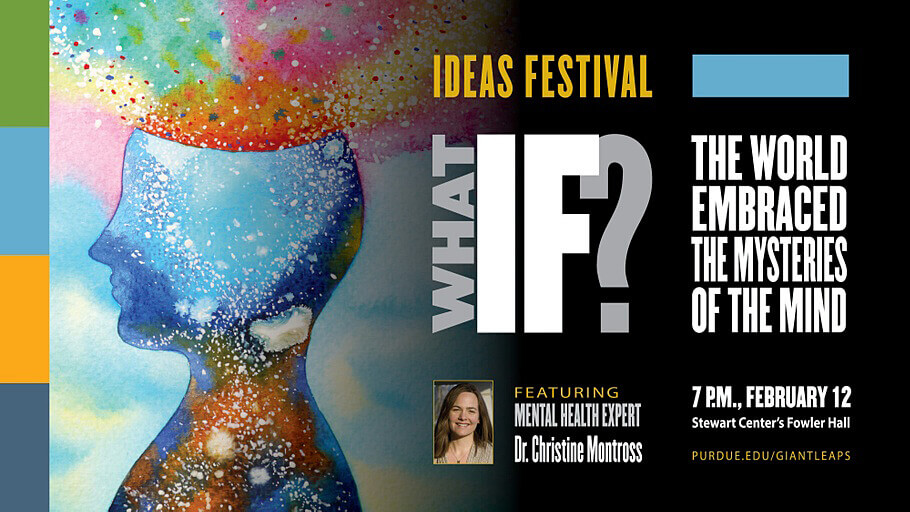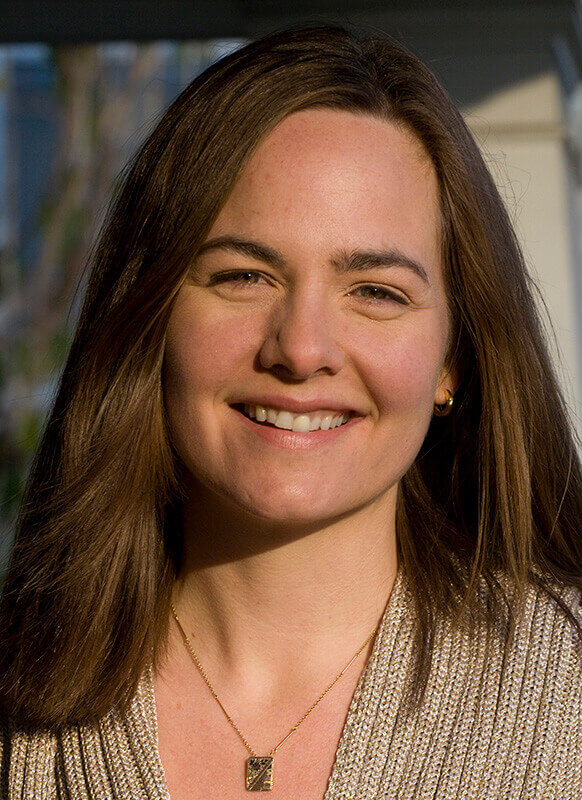January 31, 2019
What IF the world embraced the mysteries of the mind?

Dr. Christine Montross, an award-winning writer, physician and distinguished psychiatry professor at Brown University, will present "What IF the world embraced the mysteries of the mind?” at 7 p.m. Feb. 12 at Stewart Center's Fowler Hall. (Purdue University graphic)
WEST LAFAYETTE, Ind. – The mind is beautiful and complicated, and humanity continues to seek understanding, especially when it comes to aspects of mental health.
Whether it is emotional well-being, a rare disorder, anxiety or depression – just to name a few – health care providers, researchers and loved ones continue to learn and improve treatments while providing compassion.
Dr. Christine Montross, an award-winning writer, physician and distinguished psychiatry professor at Brown University, will present "What IF the world embraced the mysteries of the mind?” at 7 p.m. Feb. 12 at Stewart Center's Fowler Hall. Her talk will highlight the mysteries of the mind and mental health, especially when the tools of modern medicine fall short, drawing from her 2013 book, "Falling into the Fire: A Psychiatrist's Encounters with the Mind in Crisis."
 Christine Montross. (Courtesy photo)
Christine Montross. (Courtesy photo)
Download image
Preceding Montross' talk, readings in response to mental health by fiction writer Sharon Solwitz and poet Donald Platt, both professors in Purdue's Creative Writing Program, will be presented.
This event is part of Purdue's Ideas Festival, the centerpiece of the University's Giant Leaps Sesquicentennial Campaign, a series of events that connect world-renowned speakers and Purdue expertise in a conversation on the most critical problems facing the world. One of the Ideas Festival's themes is health, longevity and quality of life.
Other activities are planned in connection with this event and the annual Medical Humanities Collective Series:
* Feb. 11, 7 p.m., Purdue Memorial Union Commons. Performance of "The Sunset Limited." This Cormac McCarthy play, set in a busy train station, addresses issues that surround human suffering. Presented by William Caise, assistant director of the Black Cultural Center, and Richard Stockton Rand, professor and coordinator of Undergraduate Theatre Studies.
* Feb. 13, 2:30-4:20 p.m., Wilmeth Active Learning Center, Room 3127. Mental Wellness Workshop: "How to Spot and Help Someone with Mental Health Issues." Led by Brigette Mariner, business-focused health and well-being consultant at professional services firm PwC.
All events are free and open to the public, and a book signing will follow Montross’s talk.
"Our hope is that, through this Ideas Festival event and its related activities, we can have a probing and productive conversation about how together we continue to support the conversation around the topic of mental health,” said Wendy Kline, the Dema G. Seelye Professor in the History of Medicine and co-chair of the Medical Humanities Collective. “In Dr. Montross’s book, she captures compassion as she shares the very personal struggles of various individuals while providing her audience with related history and science.”
In "Falling into the Fire," Montross tells the story of a woman who habitually injures herself, ingesting light bulbs, a box of nails, zippers and a steak knife. In another case, a new mother is admitted with incessant visions of harming her child. A recent college graduate, dressed in a tunic and declaring that love emanates from everything around him, is brought to the hospital emergency room by his alarmed girlfriend.
“These are patients that Montross, a new physician, meets during rounds at her hospital's locked inpatient ward — and whom we meet as she struggles to understand the mysteries of the mind, most especially when the tools of modern medicine have reached their limits,” said Richard Johnson-Sheehan, Purdue English professor and co-chair of the Medical Humanities Collective. “These profiles are also interspersed with anecdotes from Dr. Montross' domestic life. Because she’s a poet, scientist and health care provider herself, she brings an incredible perspective that resonates with diverse audiences.”
A review in The New York Times describes "Falling into the Fire" as an intimate portrait of psychiatry and a moving reminder of "our fragile, shared humanity."
First a published poet and high school teacher, Montross took up medical studies and became an assistant professor of psychiatry and human behavior at Brown's Alpert Medical School. Using the award money from her 2010 MacColl Johnson Fellowship, she planned to conduct research in Paris on the origins of psychiatric treatment and to work on a collection of poetry, tentatively titled "Lunacy and Light." That project evolved into "Falling into the Fire."
Montross received undergraduate degrees and a Master of Fine Arts in poetry from the University of Michigan. Her third book will focus on mentally ill people in U.S. jails and prisons.
The Ideas Festival event sponsors are the Department of English, Department of History, Department of Anthropology, Black Cultural Center, Department of Psychological Sciences, Office of the Provost, Purdue Counseling & Psychological Services (CAPS), and the Patti and Rusty Rueff School of Design, Art, and Performance.
In a prelude to the February activities, Purdue faculty members in psychological sciences and counseling psychology were available following Purdue Theatre performances of "Next to Normal" in November at the Yue-Kong Pao Hall of Visual and Performing Arts.
The annual Medical Humanities Collective event is sponsored by Purdue's Medical Humanities program in the College of Liberal Arts as an outgrowth of the Cancer Culture and Community Colloquium, a partnership between CLA, the Oncological Sciences Center and Discovery Park, which ended in 2017.
Writer: Phillip Fiorini, pfiorini@purdue.edu, 765-496-3133
Media Contact: Joe Paul, paul102@purdue.edu, 765-494-9541
Sources: Wendy Kline, wkline@purdue.edu, 765-496-2518.
Rick Johnson-Sheehan, rjohnso@purdue.edu

